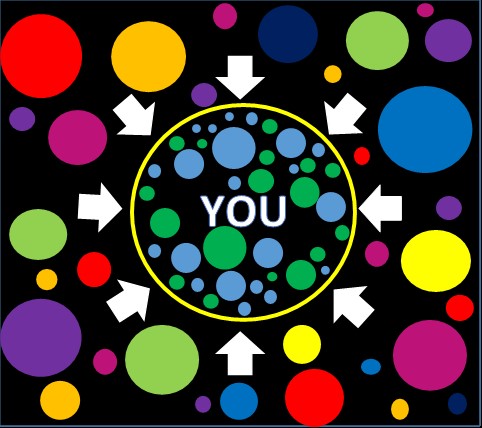Evaluating Sources: SIFT & PICK, RADAR, & ACT UP
What's a Filter Bubble?

Did you know that you have a filter bubble around you right now? That every time you do a search on Google, it tailors the results based on your previous search history? Did you know that your search results will look different if you use Google on campus as opposed to using it at a cafe in Somerville? It's because Google is making certain assumptions about you based on your IP address. While we all like customized information there is a real danger of being so trapped inside your filter bubble that you never see the other side of a story. In order to be better informed, we need to know what each side is saying about an issue and not fall for confirmation bias (reading only sources that already fall in line with our current views). Here are two free resources to help you do just that!
-
All SidesUnlike regular news services, AllSides exposes bias and provides multiple angles on the same story so you can quickly get the full picture, not just one slant.
-
ProCon.org"Promoting critical thinking, education, and informed citizenship by presenting controversial issues in a straightforward, nonpartisan, primarily pro-con format."
What do Filter Bubbles Look Like?
-
How filter bubbles shaped the 2016 electionThis piece is focused in two parts. The first explores six major dynamics that have been established from research on the topic of social networks, both online and offline. The second section pulls all of these threads together to illuminate the 2016 election. My aim is to refocus the debate.
-
The dangers of filter bubbles and health informationWebsites such as Facebook and Google use information about our previous behaviour to prioritize and display information for us. This phenomenon is sometimes called a 'filter bubble' because it means we are less likely to find information that is novel or challenging. Filter bubbles may reinforce anti-science health beliefs and make it harder to disseminate evidence-based information to the people that need it most.
How to Burst your Bubble

You can actively take control of your media consumption and step outside your filter bubble. Here's how:
-
Use DuckDuckGo as your search engineThis search engine does not track your search history, blocks advertising trackers, and never sells your personal data. You can use this search engine instead of Google.
-
How to escape Google's filter bubbleWhile there is no way to fully escape Google's filter bubbles, there are some tricks you can use to help combat some of the personalization.
-
Practice diy feminist cybersecurityThis guide is intended to be a comprehensive and accessible introduction to some of the most valuable cybersecurity tools available.
Thanks!
Thank you to Dawn Stahura of Simmons University for generously allowing us to reuse her "Evaluating Sources" Research Guide.
- Last Updated: Feb 14, 2025 11:54 AM
- URL: https://campusguides.lib.utah.edu/RADAR
- Print Page



